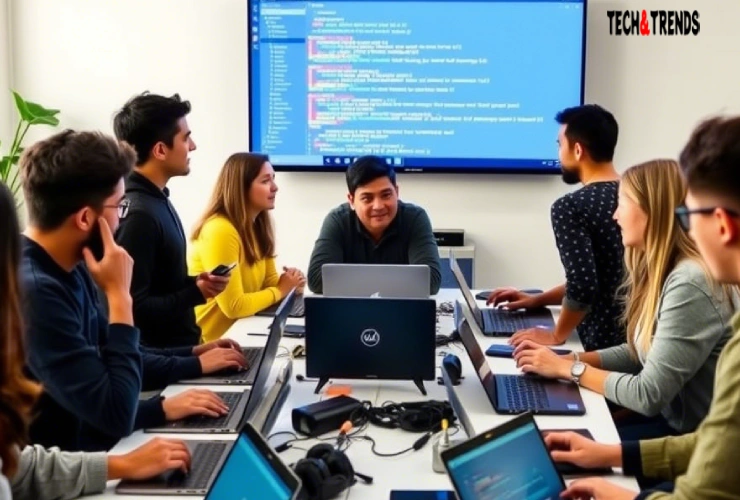In today’s world, basic tech skills are important for everyone. Whether you want to work better, talk with others, or use your devices easily, learning technology basics helps a lot. These Tech Tips for Beginners will show you simple steps to learn and feel confident, even if you are new
Tech Tips for Beginners: Essential Computer Skills You Need to Know
The foundation of all tech skills is knowing how to use a computer. This means getting comfortable with your device, whether it’s a Windows PC, a Mac, or even a Chromebook.
- Using Operating Systems: Learn how to navigate your computer’s operating system. This includes turning it on and off, opening and closing programs, and understanding basic settings. Each system has its own look and feel, but they all work similarly at a basic level.
- File Management: Knowing how to create, save, organize, and find files and folders is very important. Practice creating folders for different topics or projects and saving your documents in the right places to keep everything neat.
- Basic Troubleshooting: Sometimes things don’t work as expected. Learning simple solutions like restarting your computer, checking cables, or closing frozen programs can save you a lot of frustration.
Improve Your Typing and Use Keyboard Shortcuts
Typing is a skill that helps you work faster and more efficiently on any computer.
- Touch Typing: This means typing without looking at the keyboard. You can find free online tools and games that teach you how to type correctly and increase your speed.
- Keyboard Shortcuts: Learning shortcuts like CTRL to copy, CTRL to paste, or Curlz to undo can save you time. Different programs have their own shortcuts, so start with the basics and expand as you go.
Master Internet and Email Basics
The internet is a powerful tool, but it’s important to use it safely and effectively.
- Web Browsing: Learn how to use web browsers like Chrome, Firefox, or Safari to search for information, visit websites, and bookmark your favorite pages. Understand how to use search engines like Google to find what you need quickly.
- Email: Creating and managing an email account is essential. Learn how to send, receive, reply to, and organize emails. Also, practice good email etiquette by writing clear messages and using polite language.
Work with Word Processing and Spreadsheets
Many jobs and personal tasks require creating documents and managing data.
- Word Processing: Programs like Microsoft Word or Google Docs let you write letters, reports, or resumes. Learn how to format text, add images, and save your documents properly.
- Spreadsheets: Basic spreadsheet skills in Microsoft Excel or Google Sheets help you organize numbers and data. Start with entering data, formatting cells, and using simple formulas like sums or averages.
Create Presentations with Confidence
Presentations are a great way to share ideas visually.
- Presentation Software: Tools like Microsoft PowerPoint or Google Slides allow you to create slideshows. Learn how to use templates, add text, images, and even videos to make your presentations engaging.
Explore Basic Graphic Design
You don’t need to be a professional designer to create simple graphics.
- Canva: This user-friendly online tool helps beginners design posters, social media posts, and flyers using drag-and-drop features. Experiment with colors, fonts, and layouts to create eye-catching designs.
Understand Social Media Management
Social media platforms are everywhere, and knowing how to use them responsibly is key.
- Social Platforms: Get familiar with popular platforms like Facebook, Instagram, Twitter, and LinkedIn. Learn how to create profiles, post updates, and interact with others.
- Content Creation: Basic principles like using clear images, writing engaging captions, and posting regularly can help you build a presence online.
Learn Basic Coding Skills
Coding might sound difficult, but starting with simple languages can be fun and rewarding.
- HTML and CSS: These are the building blocks of websites. HTML structures the content, and CSS styles it. Many free tutorials online can guide you step-by-step.
- Scratch: A visual programming language designed for beginners, especially kids. It uses blocks to teach programming logic without typing code.
Use Online Collaboration Tools
Working with others online is common, and knowing how to use collaboration tools is very helpful.
- Google Workspace and Microsoft 365: These suites include tools like Google Drive, Docs, Sheets, and Microsoft Teams. Learn how to share files, work on documents together, and communicate via chat or video calls.
- Slack and Trello: These apps help teams organize projects and communicate efficiently. Start by creating channels, assigning tasks, and tracking progress.
Practice Cybersecurity Basics
Staying safe online protects your information and devices.
- Password Management: Use strong, unique passwords for each account. Consider using a password manager to keep track of them.
- Recognizing Phishing: Learn to identify suspicious emails or messages that try to steal your information. Never click on unknown links or give out personal details without verifying the source.
Tips for Learning Tech Skills Effectively
- Start Small: Focus on one skill at a time to avoid feeling overwhelmed. Master the basics before moving on to more complex topics.
- Use Free Resources: Platforms like YouTube, Khan Academy, Coursera, and Codecademy offer free tutorials for beginners.
- Practice Regularly: The more you use your new skills, the better you will get. Try to apply what you learn in daily tasks.
- Join Communities: Online forums, social media groups, and local meetups can provide support, answer questions, and motivate you to keep learning.
Conclusion
Mastering basic tech skills is easier than you might think. By starting with simple steps like using your computer confidently, improving your typing, browsing the internet safely, and learning basic coding, you build a strong foundation.
These skills open up many opportunities for work, communication, and creativity. Remember to take your time, practice regularly, and use the many free resources available online. With patience and curiosity, you can become comfortable and confident in the digital world.


Comments are closed.